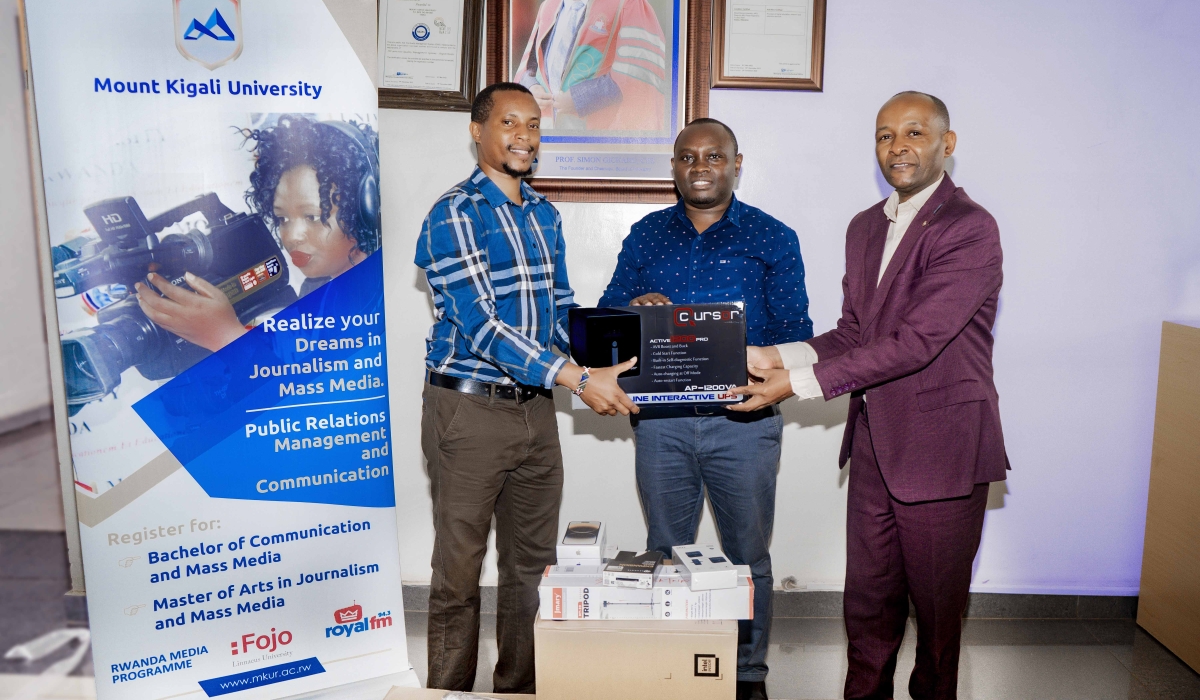Computer technology has penetrated every aspect of modern life. Every technological advancement transforms the world in a particular way. The MKU School of Computing and Informatics offers the much sought-after skills in Information Communication Technology (ICT), Informatics and Knowledge Management. The programmes are offered at certificate, diploma and degree levels in three departments: Information Technology, Information Science and Knowledge Management and Enterprise Computing.
The university has partnerships with global IT giants such as IBM and Oracle, to make the courses even more industry focused.
OUR COMPUTER SCIENCE COURSES COVER ALL ASPECTS OF MODERN ICT, GIVING STUDENTS SKILLS TO CREATE FUTURE TECHNOLOGY AND GAIN RELEVANT INDUSTRIAL EXPERIENCE.
The school has the following departments:
Our Programmes
Bachelor of Arts in Mass Media and Communication
Specializations:
- Journalism and Media Studies
- Public Relations and Communication Management
Introduction
The Bachelor of Arts in Mass Media and Communication is a dynamic and interdisciplinary program designed to equip students with advanced knowledge and practical skills in communication, media production, and critical thinking. The program provides two distinct pathways, allowing students to tailor their studies to their career aspirations:
- Journalism and Media Studies: Focus on storytelling, news reporting, media ethics, and digital content creation. This specialization prepares students for careers in journalism, broadcasting, content writing, and online media platforms.
- Public Relations and Communication Management: Concentrate on strategic communication, reputation management, branding, and corporate communication. Graduates are well-suited for roles in public relations, corporate communication, event planning, and marketing.

Program Highlights
- Hands-on Experience: Gain real-world skills through internships, media projects, and industry collaborations.
- Modern Facilities: Access to cutting-edge studios, media labs, and digital tools to enhance learning, including a modern FM Station-Royal FM.
- Global Perspective: Develop cross-cultural communication skills and explore the global impact of media and public relations.
- Expert Faculty: Learn from experienced professionals and scholars in media and communication.
Career Opportunities
- Journalism: Reporter, Editor, News Anchor
- Media Production: Videographer, Scriptwriter, Digital Content Creator
- Public Relations: PR Specialist, Media Consultant, Corporate Spokesperson
- Communication Management: Brand Manager, Event Coordinator, Marketing Strategist
Admission Requirements
- Two principal passes in any subject with English or an evidence of English proficiency document from a recognized institution, and a subsidiary in any related Arts/Science subjects with 13 points or a Diploma from a recognized University.
Why Choose This Program?
Our Bachelor of Arts in Mass Media and Communication combines academic rigor with practical experience to create versatile graduates who can thrive in the fast-paced world of media and communication. We have our own radio station-Royal 93.4 FM, Online Magazine.
Master of Arts in Journalism, Media, and Communication Studies
Mount Kigali University invites you to advance your career with a comprehensive program tailored to shape industry leaders in journalism, media, and communication. This master’s program equips students with advanced theoretical knowledge, practical skills, and research capabilities to excel in dynamic media and communication landscapes.
Program Highlights
- Advanced Curriculum: Combines cutting-edge research, multimedia production, and digital media strategies.
- Experienced Faculty: Learn from seasoned academics and industry experts.
- Specialized Modules:
- Media Ethics and Law
- Digital Media and Visual Storytelling
- Strategic Communication and Branding
- Research Methods in Media and Communication
- Global Media and Development
- Hands-on Training: Practical workshops, industry partnerships, and media simulations.
- Capstone Project: Develop a research or production-based project that addresses contemporary challenges in media and communication.
- Flexible Learning: Designed for working professionals with part-time and full-time options.
Career Opportunities
Graduates are prepared to take on leadership roles in various fields, including:
Media Professionals:
- Journalist
- News Editor
- TV/Radio Producer
- Social media sub-editors
- Media Managers
Strategic Communication:
- Public Relations Specialist
- Corporate Communication Manager
- Crisis Communication Expert
- Government communication officers/Managers
Digital Media and Technology:
- Social Media Manager
- Content Creator/Strategist
- Multimedia Producer
Academia and Research:
- Media Researcher
- Lecturer in Communication Studies
Admission Requirements
Academic Qualifications:
Bachelor’s degree in Journalism, Media Studies, Communication, International relations, Information science or related fields with a minimum second-class upper division (or equivalent).
Professional Experience (For those with third class degree (Second lower): 2 years of work experience in media, communication, or a related field.
English Proficiency:
Proof of English language proficiency (for non-native speakers).
Supporting Documents:
- Official transcripts.
- A personal statement outlining academic and career goals.
- Two reference letters (academic or professional).
Why Choose Mount Kigali University Master of Arts in Journalism, Media, and Communication Studies?
With state-of-the-art facilities, Royal FM, a global perspective, and a commitment to excellence, our program ensures you are equipped with the skills to shape the future of media and communication.

Bachelor of Arts in Film Production and Animation Studies
Mount Kigali University presents a transformative program designed for aspiring filmmakers and animators. This degree integrates creative storytelling, technical skills, and industry insights, preparing students to excel in the global entertainment and media industries.
Program Highlights
- Comprehensive Curriculum: Covers all aspects of film production and animation, including pre-production, production, and post-production.
- Specialized Modules:
- Storyboarding and Scriptwriting
- Cinematography and Lighting
- 3D Computer Modelling
- Character Animation and Rigging
- Visual Effects (VFX) and Compositing
- Sound Design and Editing
- Directing
- Practical Experience: Hands-on projects, industry collaborations, and internships to enhance real-world expertise.
- State-of-the-Art Facilities: Access to advanced equipment, animation software, and professional-grade studios.
- Capstone Projects: Create a short film or animated feature showcasing your creativity and technical skills.
- Workshops and Guest Lectures: Regular sessions with renowned filmmakers and animators.
Career Opportunities
Graduates are prepared for diverse roles in the film and animation industries, such as:
- Film Director
- Screenwriter
- Actors and Actress
- Make-up artists
- Cinematographer
- Video Editor
- 2D/3D Animator
- Character Designer
- Visual Effects Artist
- Motion Graphics Designer
- Game Developer
Admission Requirements
Academic Qualifications:
Two principal passes in Arts /sciences related subjects/13 points or a Diploma from a recognized university.
Supporting Documents:
- Official transcripts.
- A personal statement highlighting your passion for film and animation.
Why Choose Mount Kigali University Bachelor of Arts in Film Production and Animation Studies?
Our program combines creativity, innovation, and technical expertise to empower students with the tools to succeed in the competitive world of film and animation. Standard Studios and Labs.
Our Programmes
- Private sector (IT companies, banks, insurance, SACCOs)
- Government ministries, research institutes, parastatals
- NGOs (local & international), local government units, security sector
- Academic institutions, districts, research units

Bachelor of Computer Science (CS) and Bachelor of Business Information Communication Technology (BBICT) are both technology-related fields, but they differ significantly in focus, skill set, and career outcomes.
Bachelor of Computer Science (CS)
Admission Criteria
- Advanced General Certificate of Secondary Education senior 6 with two principal passes in Mathematics, Physics, or Computer Studies, and Electricity.
- Completion of vocational training (TVET) or prior coursework from accredited institutions.
Focus: Technical computing
Core Skills: Strong programming, database, Computer networks, mathematical, and technical skills, enabling them to design and build complex software, optimize algorithms, and develop new computational techniques
Career Paths: Software developer, web developers, mobile applications developers, data scientist, systems architect, machine learning experts, AI, and cybersecurity specialist
Technology Approach: Design and build software, hardware, and computational systems, often working to solve technical problems or advance technology itself
Orientation : Research and innovation
Bachelor of Business Information Communication Technology (BBICT)
Admission Criteria
- Advanced General Certificate of Secondary Education senior 6 with at least two principal passes in any of the following or related subjects: Mathematics-Physics-Computer, Web design, Electricity, Economics-Entrepreneurship.
- Completion of vocational training (TVET) or prior coursework from accredited institutions.
Focus: Practical application of IT in business
Core Skills: Balance of technical and business skills. They learn technical skills in ICT, management IT resources, analyze data for business insights, improve business processes through technology, and communicate effectively within organizational contexts
Career Paths: IT project manager, computer programmers, business analyst, systems analyst, IT consultant, database administrator, and ICT support
Technology Approach: Focus on implementing and managing existing technology solutions to streamline business processes, enhance productivity, and support decision-making
Orientation : Business efficiency and IT support
Bachelor of Information Science (BSCIS)
A multidisciplinary degree program focused on information management, library science, records management, technological, and media skills for the modern information and media environment.
Admission Criteria
- Advanced General Certificate of Secondary Education (senior 6) with at least two principal passes.
- Students from accredited universities or colleges that recognized by the Higher Education Council and Rwanda National Qualifications Framework.
- TVET graduates with specializations in: Computer applications, networking, software development, Office management, Multi-media, Front Office, or Tourism, and health records.
Career Paths
Graduates can work in:
Banks, government ministries, and parastatals, Academic institutions, NGOs (local and international), Districts and local government units and private sector as:
- Librarians – manage libraries.
- Records manager – managing, archiving, and digitizing of records
- Information management consultant: advise on strategies to organize and manage information resources efficiently.
- Operations manager: manage and optimize internal processes and workflows, often focusing on information management systems or technology platforms.
- Health information technician: manage and organize patient data, ensuring that it is accurate, secure, and accessible to healthcare professionals.


